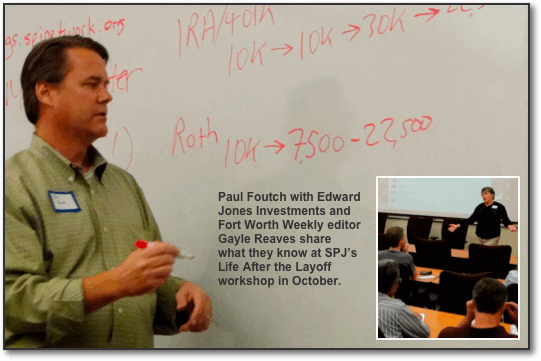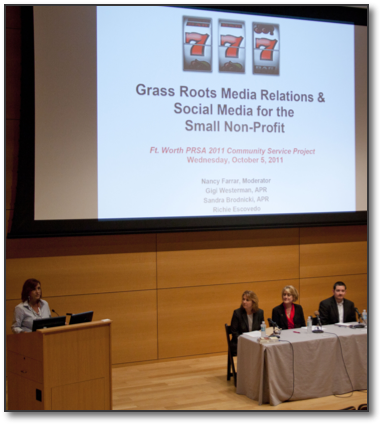Andra Bennett House, left, APR, and Laura Van Hoosier, APR,
at the PRSA Leadership Assembly in Orlando, Fla.
at the PRSA Leadership Assembly in Orlando, Fla.



Moderator Nancy Farrar with panelists Sandra Brodnicki, APR; Gigi Westerman,
APR; and Richie Escovedo, on stage from left, at PRSA’s annual service project, Oct. 5 at the Modern Art Museum
of Fort Worth.
of Fort Worth.




PRSA local update IV: Margulies Communications Group president David Margulies will discuss media trends as they impact litigation at the Dallas PRSA meeting
Thursday, Nov. 10. Register here.
Freedom of Information Foundation of Texas update: When reality TV show producers tried to get New Jersey to give them $420,000 in
film subsidies for “Jersey Shore,” Gov. Chris Christie said no, calling it wasteful spending. When producers for the popular cooking
show “Top Chef” made a similar pitch in Texas, Gov. Perry’s tourism office agreed to pay an estimated $400,000 to integrate the state’s brand into the show’s upcoming season. So exactly what are taxpayers getting for an amount of money that could hire eight public
classroom teachers for a year? The producers of Bravo’s “Top Chef” don’t want you to know, and they’re suing the Texas attorney general to make sure it doesn’t become public information. ... The day before the executive order mandating
administration of the HPV vaccine, the governor’s executive clerk sought “under the table” input on the deal, according to an internal e-mail. On Feb. 1, 2007, Gregory Davidson sent an e-mail to other staffers soliciting final comments for Perry’s executive order. “If you’ve been working offline on some changes or under the table with someone else on
this one, get your comments to me ASAP,” Davidson wrote. The e-mail was included in e-mails released by the Perry administration as part of a public records request.
===========================================================
Debating the Vision in the Trinity River Vision
by Jocelyn Tatum
Costs and water. Too much of one, not enough of the other. Those perceptions
flew about the Botanic Garden lecture hall Oct. 12 as more than 100 people,
four on a panel and the rest in the audience, jousted over the Trinity River
Vision (TRV) project.
Certified public accountant Steve Hollern, one of the panel members, said he’s not opposed to the project but is concerned about who will fund it. Even
though supporters say the project will pay for itself, he said he has “serious doubts about that.”
One of those supporters, panelist and former City Councilman Jim Lane, distributed a report detailing the money required and its sources, including
$446 million from the Army Corps of Engineers. But Hollern said 85 percent of
the money is not guaranteed, and he suggested that the city would have trouble
making up the difference, as Fort Worth is “over $4 billion to $5 billion in the red,” burdened by commitments for police and firefighter pensions, retirees’ health care and for rebuilding streets and drainage.
Panel member Clyde Picht was on the Fort Worth City Council in 2004 when the project came into being. He
compared it to an upside-down loan because costs already exceed what the city
will get back. In the beginning, he said, this was called a $360 million deal
with a billion-dollar return. Some of the panelists said costs now could top $1
billion.
Picht, Hollern and meteorologist John Basham represented the Trinity River Improvement Partnership (TRIP) on the panel. Lane
originally was to be joined by a city representative, who bowed out early, and
by TRV executive director JD Granger, who canceled a couple of hours before the event.
Lane advised those in the audience to contact their congressional
representatives if they wanted something changed. An audience member asked how
he was supposed to do that if he can’t talk to her son, referring to U.S. Rep. Kay Granger’s son, JD Granger.
Lane, who sits on the Tarrant Regional Water District board, said he doesn’t think expenses will fall on taxpayers’ shoulders and that if the project can’t fund itself, it is designed to slow down. He also said he does not think the
project will soak up all the federal dollars available in this area for flood
control.
Lane said the city made a mistake when it showcased a model of the TRV because
people saw development on top of their neighborhoods and businesses. Much has
changed since the original model, he said. “We have not done a good job of educating the public. ... This project is really
moving along. We’re actually moving dirt.”
On the water issue — “there’s no water!” a woman in the audience yelled — Basham read from Chapter 6 of the 2012 Texas Water Plan and said no new sources of
water are promised to Fort Worth for a long time. Water projects on the table,
he said, are “pie in the sky.”
“Even though the [TRV] paperwork says they’re good through 2035, that’s based on a couple of assumptions. One of those assumptions is that we’re not in drought, and currently we are in drought.” He said the focus should be on flood control and water supply and “we’re kind of missing it.”
Many in the room clapped and whistled.
Gayle Reaves, one of a panel of journalists who posed questions to Lane and the TRIP
representatives, asked Lane about concerns that the board overseeing the
project has no elected members, making it insulated from the public. “It’s a backroom deal!” a man in the audience shouted.
Reaves is editor of Fort Worth Weekly, and panel moderator Robert Francis is editor of the Fort Worth Business Press. She is a former Fort Worth SPJ
president, and he is current SPJ scholarships VP. SPJ membership VP Gene Trainor also asked questions of the panel.
===========================================================



































